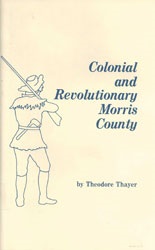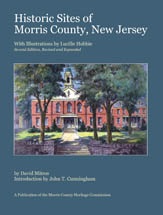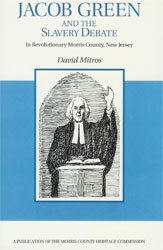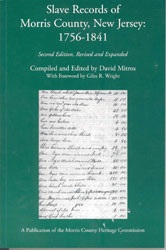Colonial and Revolutionary Morris County
by Theodore Thayer

Price: $15.00 (Hardcover)
Order book: online, by mail(PDF, 118KB)
Colonial and Revolutionary Morris County examines Morris County’s early history, from the time it was first settled as a frontier wilderness, until the end of the Revolutionary War. According to the author, “Morris County developed a society in which the leveling process of the frontier caused a democratic spirit to emerge. Consequently, the county became…a bastion for Jeffersonian principles.”
During the Revolution, “General Washington considered Morris County an ‘eagles nest’ from which he could harass the enemy within the folds of the mountains. Throughout the war, the people of Morris gave unstintingly to the support of the American cause and earned from Washington his repeated praise and gratitude.”
Published in 1975 to commemorate the Bicentennial of our nation, Thayer’s book remains the most comprehensive and detailed account of Morris County’s role in the creation of our country.
Gone to Wear the Victor’s Crown–Morris County, New Jersey and the Civil War, A Documentary Account
edited by David Mitros
Price: $12.00
Order book: online, by mail(PDF, 118KB)
According to author and historian John T. Cunningham, “Gone to Wear the Victor’s Crown” captures the ideals, goals, mixed emotions, and dreams of Morris County’s men and women before and during the Civil War. Told in newspaper accounts and editorials and letters from the front, the scope ranges from the famed (and little known) Underground Railroad to mixed emotions about the war before the conflict; from county preparations to thoughts written before an impending battle; from the home front to the distant walls of Andersonville Prison. Another fine editing performance by David Mitros, the book will provide solid reading for all Morris County residents. It will also serve as a model for other counties.”
The late County Historian and Commission member Frances Pingeon called the book, “comprehensive and riveting.” “Newspaper accounts describe the lively rallies of townspeople around liberty poles where patriotism ruled. Letters and diaries show the apathy and despair, as well as the heroism of the common soldier surrounded by death, as he fought for a cause he sometimes never fully understood. Mitros’ work is a microcosm of life in a northern county before and during the Civil War. It should be read by all scholars and laymen who want a more profound understanding of how the war affected New Jerseyans.”
Historic Sites of Morris County, New Jersey, Second Edition, Revised and Expanded
with illustrations by Lucile Hobbie, edited by David Mitros, introduction by John T. Cunningham

Price: $17.00
Order book: online, by mail(PDF, 118KB)
Originally published ten years ago, Historic Sites has remained one of the Heritage Commission’s most requested publications, long after it had gone out of print. Originally conceived to complement the Commission’s historical markers, it was intended to promote awareness of Morris County’s rich history and underscore the importance of historic preservation. This new volume, with nearly twice the number of entries as the first edition, provides a map and guide to our country’s most treasured historic sites. We hope it will inspire you to become an advocate for historic preservation, and to take pride of ownership in your own neighborhood, municipality, and county.
From the Preface to the Second Edition by Carrie A. Fellows, Administrator, Morris County Heritage Commission
Jacob Green and the Slavery Debate in Revolutionary Morris County, New Jersey
by David Mitros
 Price: $5.00
Price: $5.00
Order book: online, by mail(PDF, 118KB)
Of the many extraordinary people who have lived in Morris County, New Jersey, no one has established a more remarkable reputation as a writer, thinker, and political activist than the Reverend Jacob Green, pastor of the East Hanover Presbyterian Church from 1746 to 1790.
Green, who lived through the most critical and dangerous years of American history, swayed the public in New Jersey to support the war for independence from Great Britain. He fought for a democratic New Jersey constitution as chairman of the committee who wrote it. But Green approached heroic stature in his impassioned appeals to his fellow countrymen to abolish slavery at the time when public opinion in northern New Jersey and in most of the emerging nation fanatically defended it.
It has been said by a prominent scholar of colonial and revolutionary New Jersey that Jacob Green, although not as glamorous as Thomas Jefferson, George Washington, or Tom Paine, was ultimately more important. Many New Jerseyans who had never read Thomas Jefferson, for example, were familiar with the essays and sermons of Jacob Green. His brilliant tract advocating the separation of the colonies from Great Britain was published and circulated throughout America. So was his “Fast Day Sermon” proclaiming slavery “the crying sin of the land.”
This intensely and zealous Morris County pastor dedicated the best years of his life to the cause of freedom and democracy, issues that are very much live today.
Frances D. Pingeon (from the Foreword to Jacob Green and the Slavery Debate in Revolutionary Morris County, New Jersey)
Morris County Historic Sites Survey (39 volumes)
Order survey: online, by mail(PDF, 118KB)
This survey comprises information, observations, photographs, maps, and National Register listings covering historic sites throughout Morris County. Copies are available from the Heritage Commission. Prices of individual volumes vary. The survey also is available for public use at the Morris County Heritage Commission office, County College of Morris, Morris County Library in Hanover, the Joint Free Library of Morristown and Morris Township in Morristown, and the Historic Preservation Office in Trenton.
Slave Records of Morris County, New Jersey: 1756-1841
compiled and edited by David Mitros

Price: $11.00
Order book: online, by mail(PDF, 118KB)
“Slavery, and other early American experiences in the lives of Africans in New Jersey, is still a largely unknown territory. Fortunately, David Mitros’ Slave Records of Morris County, New Jersey: 1756-1841 adds to public knowledge of slavery’s long history in our state, and it illuminates how the challenged lives of African Americans here were accounted for. A model for the kind of historical documentation and interpretation that other New Jersey counties must do, this book also dignifies the presence of enslaved black people in our past.
Clement Alexander Price, Ph.D., Professor of History, Rutgers University, Newark Campus
The strength of this work is the gathering of primary source materials from public records focused on a rural Northern county in a slave owning northern state including the relevant public legislation, manumission papers, slave advertisements, runaway slave notices, slave bills of sale, and wills mentioning slaves as property, both those conveying sales and those providing for their freedom and care. The second major strength of is the careful and through work of the author in the introductory essays to each section which are themselves thoughtful texts…. Mitros has laid the foundation for sustained scholarship on the black experience in slavery in Northern New Jersey, and the prototype project for all scholars trying to understand the American experience. The second edition . . . belongs in every collection on New Jersey history and the American experience in the nineteenth century.”
David Cowell, Ph.D., Professor of Political Science at Drew University and President of Advocates for New Jersey History